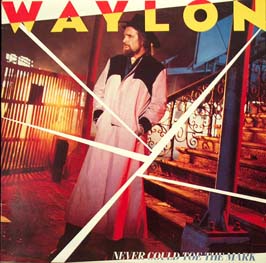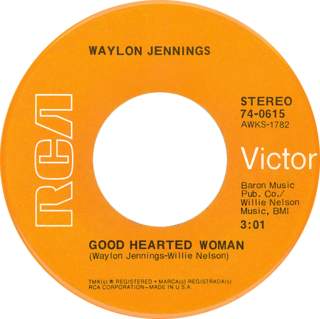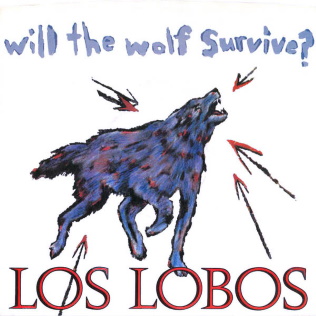Related Research Articles

Dreaming My Dreams is the twenty-second studio album by American country music artist Waylon Jennings. The album was co-produced with Jack Clement and recorded at Glaser Sound Studio in Nashville, Tennessee, between February and July 1974.

Wanted! The Outlaws is a compilation album by Waylon Jennings, Willie Nelson, Jessi Colter, and Tompall Glaser, released by RCA Records in 1976. The album consists of previously released material with four new songs. Released to capitalize on the new outlaw country movement, Wanted! The Outlaws earned its place in music history by becoming the first country album to be platinum-certified, reaching sales of one million.

Never Could Toe the Mark is an album by American country music artist Waylon Jennings, released on RCA Victor in 1984.
"Where Corn Don't Grow" is a song written by Roger Murrah and Mark Alan Springer. It was first recorded by Waylon Jennings on his 1990 album The Eagle, peaking at #67 on the country singles charts that year. Six years later, Travis Tritt covered it on his 1996 album The Restless Kind. Also released as a single, his rendition was a Top Ten country hit in 1997, peaking at #6 on the same chart. On April 12, 2021, rising country star Riley Green released a cover of the song in an ode to both Tritt and Jennings.
"This Time" is a song written and recorded by American country music artist Waylon Jennings. It is the title track from the album This Time and was released in April 1974 as the album's first single. The song reached No. 1 on the Billboard Hot Country Singles chart in June 1974 and was his first of fourteen country No. 1 hits.

"Are You Sure Hank Done It This Way" is a song written and performed by American country music artist Waylon Jennings. It was released in August 1975 as the first single from the album Dreaming My Dreams. The song was Waylon Jennings' fourth number one on the country chart as a solo artist. The single stayed at number one for one week and spent a total of sixteen weeks on the country chart.

"Good Hearted Woman" is a song written by American country music singers Waylon Jennings and Willie Nelson.

"Just to Satisfy You" is a song written by American country music singers Waylon Jennings and Don Bowman in 1963. Jennings included the song in his performing repertoire, and on radio, where the song became a local hit in Phoenix, Arizona.
"Only Daddy That'll Walk the Line" is a song written and originally recorded by American country music singer Jim Alley and was also co-written by his father Gene Alley. It was made famous by American country music singer and musician Waylon Jennings.
"Shine" is a song written and recorded by American country music artist Waylon Jennings. It was released in November 1981 as the first single from his album Black on Black. The song reached #5 on the Billboard Hot Country Singles chart and #1 on the RPM Country Tracks chart in Canada. It was also the closing theme in the 1981 film "The Pursuit of D. B. Cooper" under a bluegrass version of the song.

"Can't You See" is a song written by Toy Caldwell of The Marshall Tucker Band. The song was originally recorded by the band on their 1973 debut album, The Marshall Tucker Band, and released as the album's first single. It was re-released in 1977 and peaked at number 75 on the Billboard Hot 100. Cover versions of "Can't You See" have charted for Waylon Jennings and the Zac Brown Band with Kid Rock (2010).
"The Days of Sand and Shovels" is a song written by Doyle Marsh and George Reneau, and recorded by American country music artist Waylon Jennings. It was released in April 1969 as the second single from his compilation album The Best of Waylon Jennings. The song peaked at number 20 on the Billboard Hot Country Singles chart. It also reached number 1 on the RPM Country Tracks chart in Canada.
"Rainy Day Woman" is a song written and recorded by American country music artist Waylon Jennings. It was released in December 1974 as the second single from the album The Ramblin' Man. The song reached number 2 on the Billboard Hot Country Singles & Tracks chart.

"Are You Ready for the Country?" is a song written by Neil Young and released on his 1972 Harvest album. The track features Young on piano backed by the studio band dubbed The Stray Gators, comprising Jack Nitzsche on slide guitar, Ben Keith on pedal steel guitar, Tim Drummond on bass, and Kenny Buttrey on drums. Backing vocals on the track are by David Crosby and Graham Nash. The recording was made in a studio set up in a barn on Young's ranch.
"Women Do Know How to Carry On" is a song co-written and recorded by American country music artist Waylon Jennings. It was released in June 1982 as the third single from the album Black on Black. The song reached number 4 on the Billboard Hot Country Singles & Tracks chart. The song was written by Jennings and Bobby Emmons.

"America" is a song written by Sammy Johns, and recorded by American country music artist Waylon Jennings. It was released in September 1984 as the first single from his compilation album Waylon's Greatest Hits, Vol. 2. The song reached number 6 on the Billboard Hot Country Singles & Tracks chart.
"Drinkin' and Dreamin'" is a song written by Troy Seals and Max D. Barnes, and recorded by American country music artist Waylon Jennings. It was released in June 1985 as the first single from the album Turn the Page. The song reached No. 2 on the Billboard Hot Country Singles & Tracks chart.

"Will the Wolf Survive?" is a single by American Chicano rock band Los Lobos. It was released in 1984 as the second single from their album How Will the Wolf Survive? The track was recorded with a drum machine.
"If Ole Hank Could Only See Us Now" is a song co-written and recorded by American country music artist Waylon Jennings. It was released in January 1988 as the second single from the album A Man Called Hoss. The song reached number 16 on the Billboard Hot Country Singles & Tracks chart. The song was written by Jennings and Roger Murrah. Jennings would perform the song live in a cameo appearance during episode 2 of Tanner '88.
"The Conversation" is a song recorded by American singer-songwriters and musicians Waylon Jennings and Hank Williams Jr. Originally, the song was included on Williams Jr.'s 1979 album Whiskey Bent and Hell Bound. The track was later reissued on Jennings' 1983 album Waylon and Company, which consisted almost entirely of duets, and was released as the album's second radio single. A music video was made to promote the single, a rarity for country music at the time. It was the first for Jennings and the second for Williams, with his first being "Queen of My Heart". The song was a moderately successful hit and reached number 15 on the Billboard Hot Country Singles & Tracks chart.
References
- ↑ Whitburn, Joel (2004). The Billboard Book Of Top 40 Country Hits: 1944-2006, Second edition. Record Research. p. 175.
- ↑ "Waylon Jennings Chart History (Hot Country Songs)". Billboard.